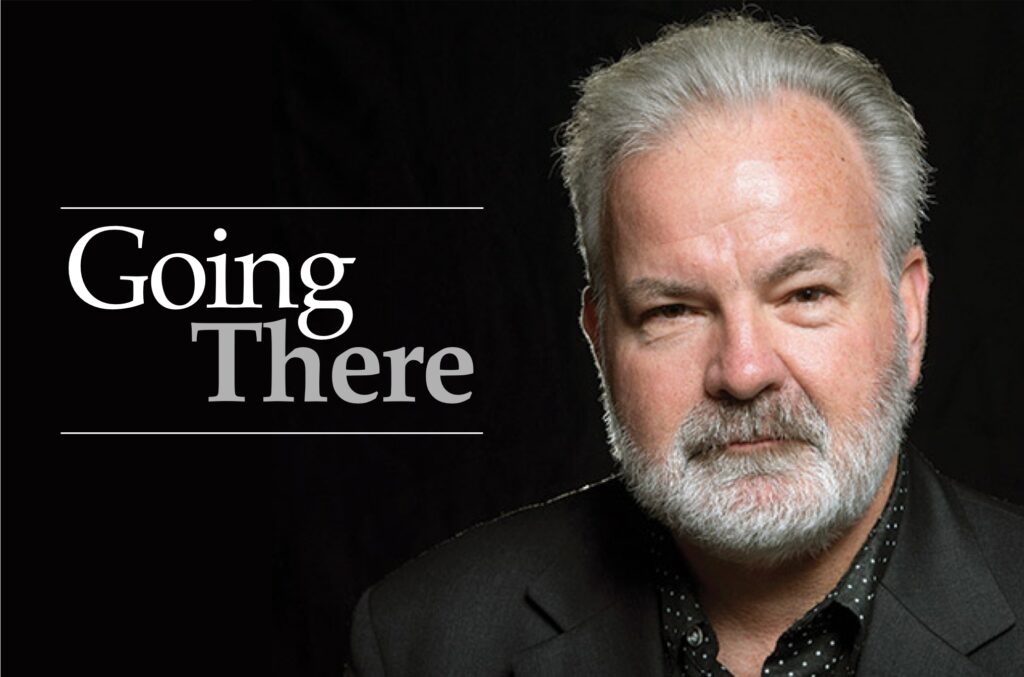Taking it to, and doing it in, the streets
by John Pixley
The last time I saw Gerald Haynes, he could barely talk. It was difficult to hear and understand him, his voice scarcely above a hoarse whisper, as he lay in the hospice bed that had been brought into his room at a Claremont retirement home, all but too weak to lift his hands. But he shone.
He shone, as he had always shone, filling the room with light and love, even with death quickly approaching.
I only knew Gerald for maybe the last decade of his 90-year-long life, and for most of that time, he used a walker to get around. But using a walker didn’t keep him from shining. No. In fact, he used the walker to help him shine all the brighter, often having a poster advocating peace taped to its front and some flyers about an upcoming demonstration or ballot initiative in its rack to hand out.
Gerald did the best he could with whatever energy he had. It was not easy for him to slow down in his work for peace. If he had his way, he would not have stopped going, as the founder of AIMS, to high schools and community colleges to provide alternative ideas for service, countering the military recruiters there. He would not have stopped working with the Alternatives to Violence Project, the Peace with Justice Center of the Pomona Valley or the Martin Luther King Project.
Gerald delighted in doing this work and, later, when he could no longer do it, in seeing others do it. In recent months, I went to see him regularly as he sat in a reclining chair in his room, and he often shared passages from articles he had read about people working for peace or helping the less fortunate. He would smile and laugh, emotion spilling out and eyes twinkling, like a little boy discovering a new treat. He literally delighted in it.
This delight and this light touched a lot of people. That much was clear at a memorial held 2 Saturdays ago at Claremont Place where Gerald lived. This was the second of 2 such services—the first was held the previous day in Whittier where he lived before moving to Claremont—and it was filled to the rafters, literally, with an overflow crowd seated up on a balcony. Many of those attending were eager to share stories of Gerald and how his hands-on love and joy had impacted their lives and the world in which they live.
I don’t think that Gregory Toliver was at the memorial, but if he had been, I think he would have recognized a kindred soul in Gerald. Like Gerald Haynes was, Gregory Toliver, a leader in Occupy Claremont, is a hands-on man, going out into the streets and into the world, trying to bring light and love to make things better.
As I have written about before, Mr. Toliver literally went out into the streets, living in front of City Hall for several months as part of Occupy Claremont, which began almost a year ago. Although no longer camping in front of city hall, having been ordered out, Mr. Toliver and the other Occupy Claremont activists are still very concerned about those who find themselves having to live in the streets in Claremont, and they continue to work hard to get the rest of us to be aware of and concerned for the homeless in our community.
I was reminded of all this shortly before the memorial when I heard Mr. Toliver speak. He pointed out, again, that many of the homeless in Claremont have serious health issues, including mental illness. In addition, although they feel safe in Claremont (in contrast to a place like Pomona or Los Angeles), they don’t trust us “in our nice houses” and feel that “their very lives are illegal.” It is often the case that they use alcohol and drugs, usually to self-medicate and—feeling that they are already illegal and shunned, if not abused—it is not surprising that, as Mr. Toliver explained, getting a ticket for such use is meaningless or a joke.
He mentioned that when Phil Greene, a homeless man, died in front of city hall as he was spending a night at the Occupy Claremont campsite in January, he owed more than a thousand dollars in tickets for being drunk in public. These fines, which clearly couldn’t be paid, were no doubt the furthest thing from Mr. Greene’s mind.
I’m not sure if many of us would go as far as Mr. Toliver has in trying to reach out to and understand the homeless in Claremont, but perhaps we can see these people as fellow humans who need our help rather than to be banned and thrown away.
And surely we can see that, as Gerald Haynes showed in his life, there are plenty of ways to get things done and do good—even in a walker, even when one has to slow down—to bring light and love into a sometimes dark world, a sometimes dark Claremont.
As broadcast journalist and author (Who Stole the American Dream?) Hedrick Smith said when he appeared at the Atheneum at Claremont McKenna College during the same week, it is time that we stop thinking that “they”—Washington, DC, the government, the state—will act and that we get out and do what needs to be done ourselves.









0 Comments